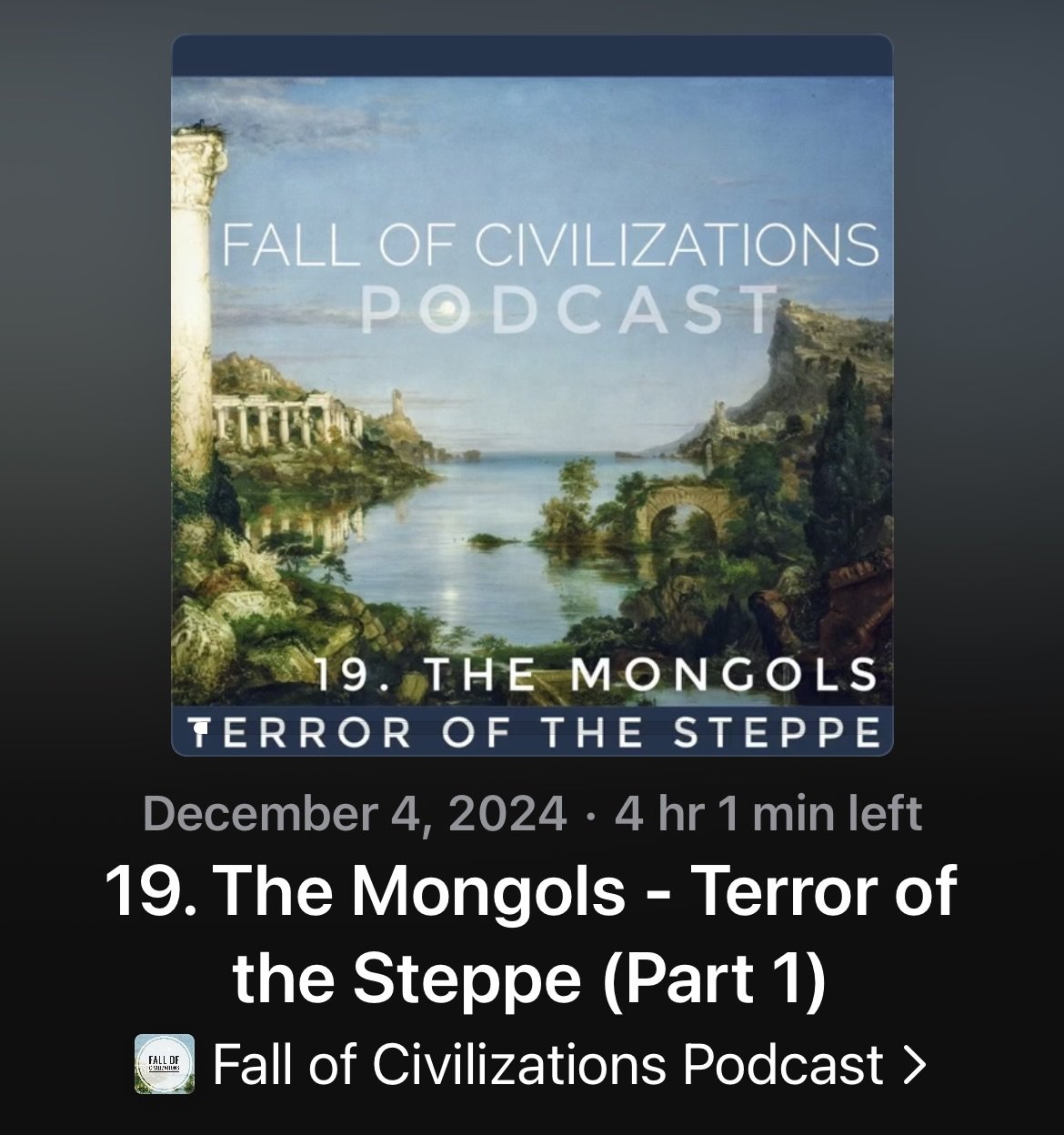“Fall of Civilizations Podcast” Episode 19, Parts 1 and 2: The Mongols

Fandom found me real quick after meeting Paul Cooper’s “Fall of Civilizations Podcast” a few years back, and I was thrilled to find a stout backlog of Cooper detailing exactly what the title promises: historical arcs from prehistory to peak to plummets (further divided into slow, fast, and dissipating ends depending on the people) of a remarkable variety, ranging from the Rapa Nui people of Easter Island to the vikings of Greenland, Phoenicians to the Songhai Empire of northwestern Africa, Incans to China’s Han Dynasty.
Each episode is soundly framed with a commitment to detail, balanced pacing, and production value that meets but never exceeds the power of the stories in focus, leaving listeners with poignant lessons on the essential nature of adaptation, prescient perspectives on current events, and top-tier character studies.
After inhaling the episodes on hand and loving every second of the most-recent Egyptian episode that dropped in early 2024, a mix of trust and enforced patience has come with my waiting for more episodes.
Major congratulations are very much due to Cooper for his book, The Fall of Civilizations released in April. But, naturally, I was more than curious to see which place and time would find Cooper’s talents next.
Fans were rewarded on December 5th, 2024 with a sizable two-parter, just short of five and a half hours total, carrying listeners through the story of the Mongols.
As with every episode of “Fall,” we are duly warned that we can not know how accurate any account may be.
This is especially welcome as the most-quoted source in this episode, The Secret History of the Mongols, leans into events and elements that break believability with some noteworthy forays into magic and monsters, but arrive fine with this qualifier.
That said, and with all due respect to past episodes, this is my favorite entry in the series, and one of the best stories I’ve heard in any medium.
As with any great story, the characters stand front, center, and strong. In Cooper’s hands, their journeys, losses, and triumphs hit as compelling as they are masterfully placed within the larger context of an entire culture’s birth and ultimate breakage.
A quick example: without giving too much away, we get to hear how Jamukha, effectively a blood brother to the man who would be known as Genghis Khan, “flew into a rage” at the latter’s request for support in rescuing his kidnapped wife, quoted in The Secret History of the Mongols:
A black leather war drum with its booming bellow I have beaten, a steed with swift steps have I saddled, a steel shirt have I worn, a solid spear have I seized, a stinging arrow on my string have I strung, to slaughter all the savage Merkit I set out.
These types of quotes run abundant in the episodes, widening eyes as much as they impress with their artistry: “I’m dressed and lethally armed, brother, let’s go.”
Among many high-points, we get ingenious war strategies, demonstrating where one fights best by fighting smart, including how culture that’s quite comfortable being mobile can get an enemy to give chase until fatigue sets in, at which point a pounce from the side by hidden forces spells victory.
We see the primacy of history’s twists outranking human will, including how Genghis Khan was very ready settle down, twice, but violent confrontations, including a needlessly-murdered ambassador, pulled him back into warfare.
The imagination flies with the possibilities around the fact that, if not for one leader’s death in particular, the Mongols would have steamrolled over the European Renaissance. It was news to me that one Mongol leaders went so far as to send a letter threatening imminent invasion to the pope, but was waylaid by matters I won’t spoil here.
We also learn how the Mongols contributed more than most to history during their reign, including opening byways for world-changing technology like the compass, the printing press, and gun powder.
All of this said, the inherent tragedy and sadness that comes with any warfare cannot be glossed over, and Cooper makes no attempt to do so. The death tolls are indeed staggering, one attack on Kiev in particular by the Mongols seeing an estimated 48,000 dead out of 50,000. The accounts that come with this attack and many more bring pause, and are worthy of trigger warnings.
Its cohesive, multi-perspective approaches like this that add value to the volume of each “Fall of Civilizations” episode, at once edifying, often entertaining, and bringing much to reflect on with the parallels one sees, clearly, in societies at any time over-stretching and indulging themselves.
For all of these reasons, I appreciate and look forward to wherever Cooper takes “Fall” next. I do so with patience that is difficult to contain, but is, clearly, well worth it.
